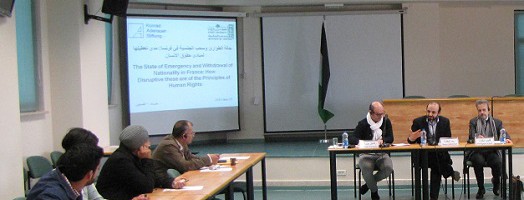The State of Emergency and Withdrawal of Nationality in France: How Disruptive these are of the Principles of Human Rights
Birzeit ‒ 15 February 2016: In the context of activities sponsored by the French Universities Consortium in support of the Faculty of Law and Public Administration at Birzeit University,
the Institute of Law (IoL) organised a legal encounter on The state of emergency and withdrawal of nationality in France: How disruptive these are of the principles of human rights. Held in cooperation with the Faculty of Law and Public Administration, the encounter came in the aftermath of the November 2015 terrorist attacks on Paris. Several measures have ensued these attacks, including a declaration of the state of emergency and French Parliament’s approval to extend the state of emergency. The presentation was delivered by Raphael Porteilla and Philippe Icard, professors of political science at the Study and Research Centre in Law and Political Science (CREDESPO), University of Burgundy, France.
In his opening remarks, Mr. Jamil Salem, IoL Director, welcomed both the speakers and the audience. In view of the continued enforcement of the state of exception in many Arab countries, the subject addressed in this legal encounter would be of particular importance to Palestine and to the broader Arab region.
The state of exception has significantly reflected on public rights and freedoms across the Arab world. Mr. Salem explained that this legal encounter was held in the context of major changes in the international context, including the attacks on the French capital. Reactions of the French authorities were so far-reaching that they have impacted public rights and freedoms across France. According to Mr. Salem, the legal encounter “is part and parcel of continued cooperation between Birzeit University and French universities.” To learn lessons, Mr. Salem elaborated that the presentation should help understand the current context in France. He called the audience to actively participated in and enrich ensuing discussions.
Dr. Porteilla made a detailed presentation on the measures the French government has taken following the terrorist attacks on Paris. The Council of Ministers declared the state of emergency, which the French President approved. With the possibility of renewal, the Parliament then passed the Law on Extension of the State of Emergency. A draft law on the withdrawal of nationality was also proposed. According to Dr. Porteilla and the audience, the draft law was a serious violation of human rights as well as principles of the French Republic. Dr. Porteilla commented that Articles 16 and 36 of the French Constitution, which regulate the state of exception, “do not apply to the measures taken by the French government on 14 November 2015, including declaration of the state of emergency.” In conclusion, Dr. Porteilla made reference to the efforts seek to amend the French Constitution with a view to ensuring enforcement of the state of emergency and approval of the Draft Law on the Withdrawal of Nationality. In this context, French public opinion polls showed a trend against recent measures implemented by the French government.
It is worth noting that declaration of the state of emergency vests law enforcement agencies with exceptional powers, which are unlawful under normal circumstances. These include restrictions on movement, search, and detention without arrest warrants. In tandem with provisions of the Constitution and relevant laws, however, these measures are legalised under the state of emergency. Still, the state of emergency measures should be under permanent control of both the Parliament and the Judicial Authority.
Dr. Icard made a historical overview of declaration of the state of emergency in France. Since 1956, the terrorist attacks of 14 November 2015 have marked the seventh occasion, on which the state of emergency was declared in the country. Dr. Icard reviewed the conditions, which must be fulfilled in order to declare the state of emergency. These comprise formal conditions, including the form by which a declaration of the state of emergency is issued, as well as the geographical area and period of time it covers. Objective conditions are informed by a threat to public order and peace.
The latter are broad and loose concepts, allowing room for authorities to abuse relevant powers. Hence, the measures taken to enforce the state of emergency should be under control of either the Constitutional Council or the Judicial Authority. In this context, the Decree on the State of Emergency can be challenged. However, claiming that it an act of sovereignty, the government can immunise the said decree against judicial control. Additionally, Dr. Icard presented on some court cases, which have arisen from the exceptional measures implemented to enforce the state of emergency and the Draft Law on the Withdrawal of Nationality. The latter, according to Dr. Icard, is in conflict with many principles of the French Republic, particularly the principle of equality. Many people, especially those who hold the French nationality only, would probably end up stateless.
In the ensuing discussion, the audience raised questions and made informed interventions. These mainly addressed the Draft Law on the Withdrawal of Nationality and the need to extend the state of emergency and need for them at the present time.
The encounter was held with support from the Konrad Adenauer Stiftung ‒ Palestinian Territories.











